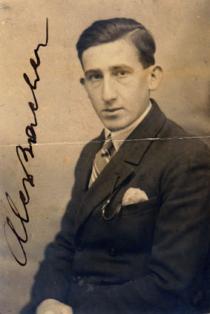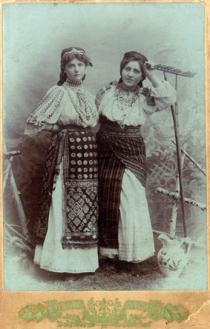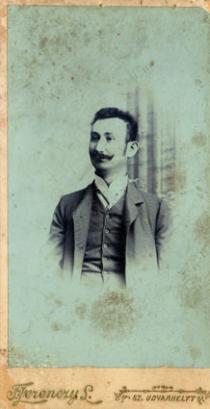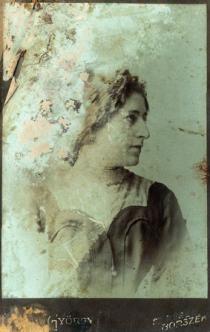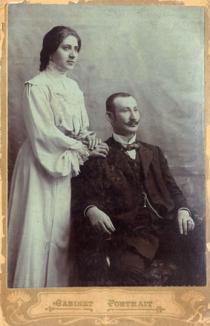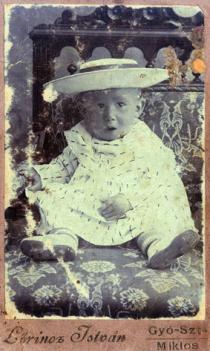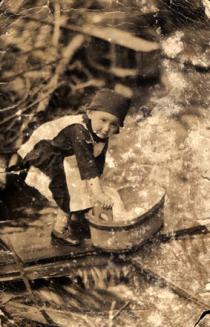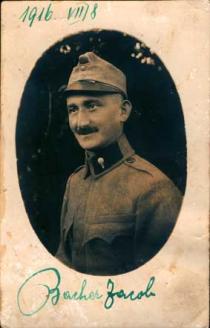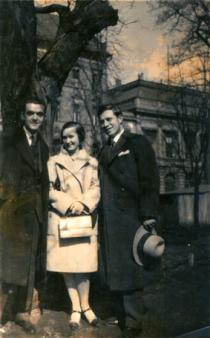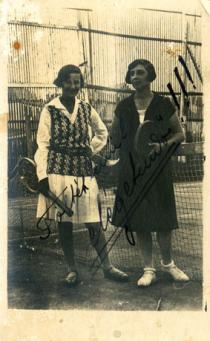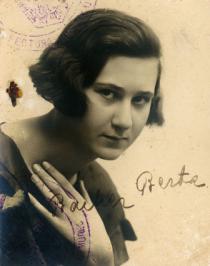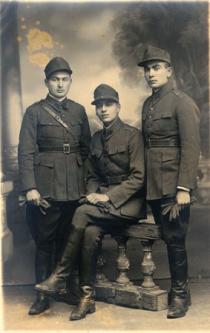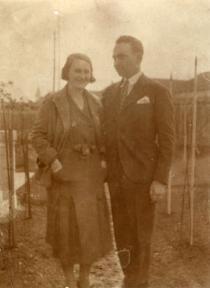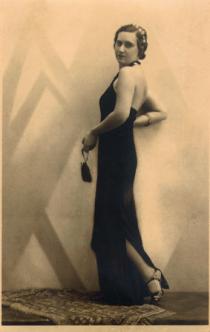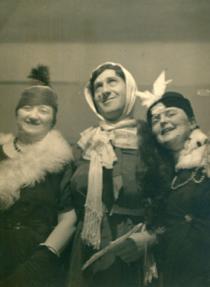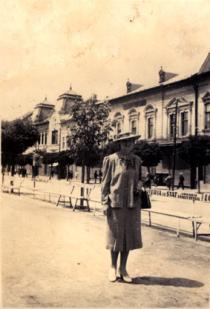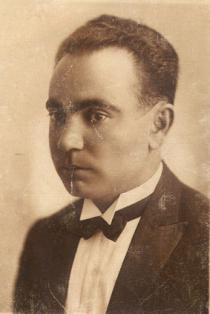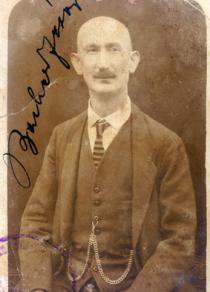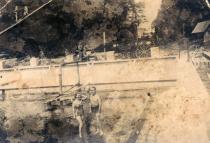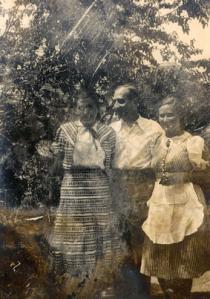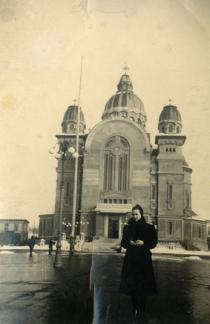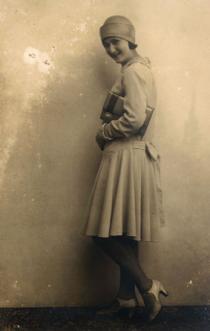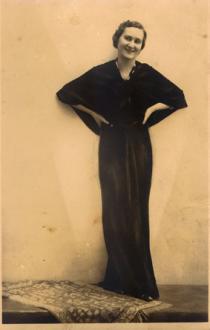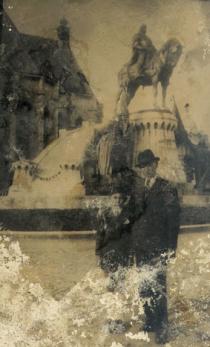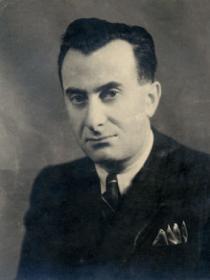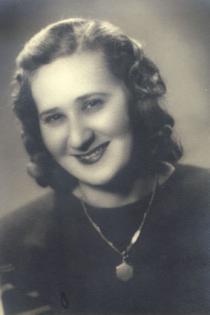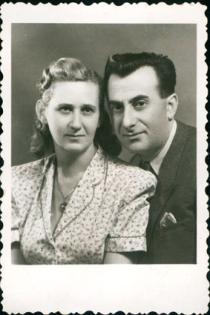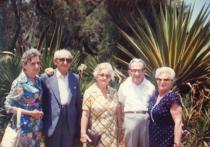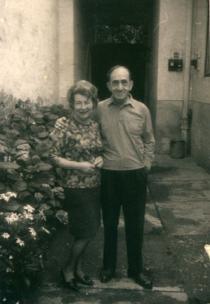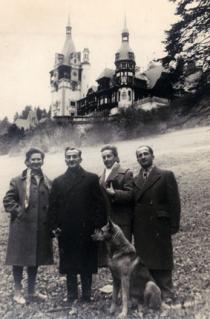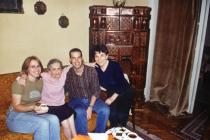This photo was taken in Szinaja [in Romanian Sinaia, 47 km to the south from Brasov]. You can see the Peles Castle in the background. Two colleagues are with us. They are on the right. They weren’t a couple, but my husband’s colleagues. Both were clerks. The dog belonged to the person who took the picture. We went on excursions all the time. This was in autumn, because we are all wearing coats. If the weather was bad, we played rummy, cards, domninoes, we listened to the radio, we had fun, we ate. If the weather was fine, we rambled, we climbed the mountains. Usually we stayed two weeks and a half, we stayed in a villa. There were such beautiful villas, but hotels too. But both of us got place in a villa. Not in the same one, but close to each other. Both had rooms with tile stoves, so we heated as much as we needed. And we had bathrooms of course, with English toilet. I wouldn’t say I sat down, but I took a shower. I took a shower on foot. I was very demanding in these matters, I got ashamed a few times because of this, because I couldn’t have accepted for example to wash myself in a peasant cottage, using I don’t know what toilet. Either I have enough money to spend my holidays in a civilized way, either I stay home. These were all modern villas, but after the war they were nationalized and rented to tourists, and it was cheap in autumn. I don’t know, I think they got holidays only then - it didn’t matter for me -, because I wore a winter coat. From the colleagues the man is Jewish, the woman is Christian. Her name was Barabasi, but everybody called her Bari. The main director of the company fell in love with her, and married her. The man didn’t have a good marriage, that was it. He was good in his profession, he was a clerk for a long time.
There were nonsense things at my husband's workplace in the communist era. In the morning, before starting to work, they had newspaper reading. My husband told them, 'I got used since I was a student to read the newspapers, I took the paper, I read it at home.' He had this habit of reading the newspaper from home. We subscribed from the beginning to the local newspaper, the Nepujsag. I was a housekeeper. Then I fell sick with my nerves, and we had to renounce emigrating. It was a misery at that time. We had a very hard life in the 1960s. None of us was a party member, neither me, nor my husband. I didn't take part in anything. It didn't mean a disadvantage that my husband wasn't a party member, they acknowledged it. He wanted to quit it. They offered him a chief accountant position at the August 23 [the local furniture factory], at the sugar works, and he wanted to quit, but they didn't let him go. And if they don't issue the paper, he looses his years [so they wouldn't take them into account when calculating his pension].
At the beginning, when this association was established, they organized so-called social evenings [for the colleagues], so we brought some cakes, biscuits, everybody at their choice. Once somebody was talking there about baking, from what and how one could bake, and I let it slip that: 'Oh my God, the yellow gateau is so simple, one puts a little cacao on it, it has to be stirred, and one prepares a marbly pie.' At this moment a saucy comrade started to laugh: 'Well, her ladyship got used to cacao…' When I really would have worked on it, I was organizing, so that as many people came as possible, and that buffet would look [nice], and a chief bigmouth hurls this into my face. Well then, I thought, to hell with you all, I will never come here again.
We didn't observe Purim and Chanukkah. When we had to go to the synagogue, we went together. He had very nice colleagues. It happened sometimes that a delegation or a superior came from Bucharest, from the ministry right when it was holiday. My husband says: 'Woe, the delegation is announced for tomorrow…" His colleague, Abi says: 'Never mind, just go to the synagogue, we will settle this in your place. Go tranquilly, don't you think at all about coming to the office!' He had such colleagues, and such a director too, he overlooked it. In those times they started to look after to have results, they came to their senses. The personnel managers didn't have so much influence anymore. The 'csebres', that's how my husband called the cadre class. You know, those who make the 'cseber' [buckets] are called 'kadar' [cadres]. So the management didn't care so much, they were interested in how people worked. During the communist era we were members of the Jewish community, we always paid the membership fee. We paid it under our own name. There were people who paid, but not under their own name. However my husband never thought of proceeding otherwise, especially that they knew he was going to the synagogue. They accepted him as he was. This was an elite class, there weren't so many good-for-nothing people, one had to be good in his profession, so a milkman from the street couldn't have been employed there. Perhaps in the cadre class. There were times when the financial management of the wood industry from Maramarossziget to Csikszereda was in his hands. I don't know how many thousands of workers got their salary in right time, that's why he got his award, as it never ever occurred that the salary would be late.

